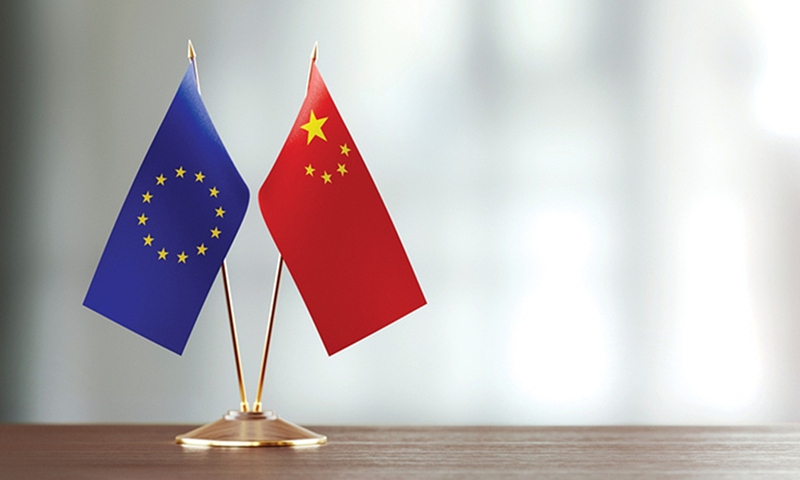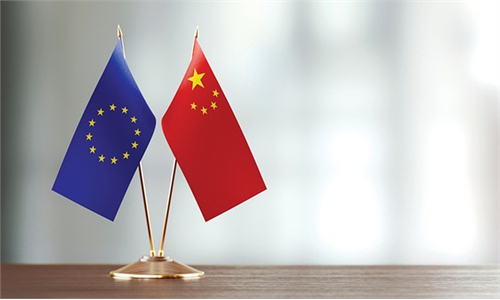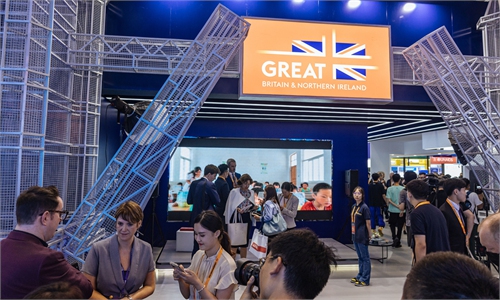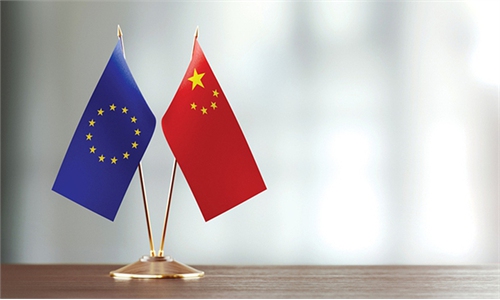Commerce chamber says EU should reject 'decoupling' from China, strike right balance between collaboration and competition

China-EU Photo: VCG
The European Union Chamber of Commerce in China has suggested that the EU continues to proactively engage with China, reject calls for disengagement and ensure that EU's China strategy reflects both existing and emerging priorities and challenges, striking the right balance between collaboration and competition, according to a paper released by the commerce chamber on Wednesday.
Experts noted that as China and Europe are both contributors to world peace and prosperity, they should seek to maximize cooperation, and any so-called decoupling from China is unrealistic and impossible.
In addition, China will continuously release the dividends of development with the rest of the world via its recovering economy, and its determination to expand opening-up will not change.
According to the European Business in China Position Paper 2023/2024, the commerce chamber said that China's current policy agenda and the EU's targeted approach to mitigate risk still leave plenty of opportunities to strengthen the bilateral relationship.
WTO reform, international standardization and tackling climate change are all areas where bilateral cooperation can and should deepen. The focus on both sides should be to rebuild bridges so that these ties can continue to flourish in the long term, read the document.
"What I think is very important is that China now opens the doors and helps us with all the confidence of European companies that China has a market that welcomes foreign investment," Jens Eskelund, president of the European Union Chamber of Commerce, told the Global Times on Wednesday.
Last week, the European Commission launched an investigation into whether to impose punitive tariffs to protect EU producers against cheaper Chinese electric vehicle imports it says are benefiting from state subsidies.
"We think that China will continue to be very important for European companies. It is a place that in many industries is at the forefront of technology, development and innovation. I describe China as a 'fitness center' for European companies," Eskelund noted when he was asked about his opinion on EU's policy.
Mercedes-Benz Group AG's top executive sees measures to decouple from China as a risk to healthy competition and global automotive supply chains, according to a report by Bloomberg on Tuesday.
"The open market is what drives growth and what drives wealth creation," Mercedes-Benz Chief Executive Officer Ola Källenius said in an interview with Bloomberg Television in New York. "Let's keep markets open and let market participants fight it out."
"The EU should listen carefully to the voices of the auto industry and provide a fair, non-discriminatory and predictable market environment for companies from all countries," the Chinese Foreign Ministry said on Wednesday.
There is no direct conflict between China and Europe, and they have huge room for cooperation, including in fields of biomedicine, new energy and digital technology. The decoupling of the EU from China is unrealistic and impossible, Wang Peng, an associate research fellow at the Beijing Academy of Social Sciences, told the Global Times on Wednesday.
The paper also noted that China's economic slowdown is reported as the top challenge faced by European businesses.
"The Chinese economy goes through cycles, as do Western economies, and the pressure facing China cannot be dismissed as China-specific concerns. The short-term problems of the economy have been dealt with by policy measures... which can be reflected by the August data. Foreign investors should not, and in fact are not, making investment decisions based on short-term data," Li Yong, a senior research fellow at the China Association of International Trade, told the Global Times on Wednesday.
In August, industrial output rose 4.5 percent year-on-year, up from 3.7 percent in July, and retail sales grew 4.6 percent, up from 2.5 percent in July, the National Bureau of Statistics said.



